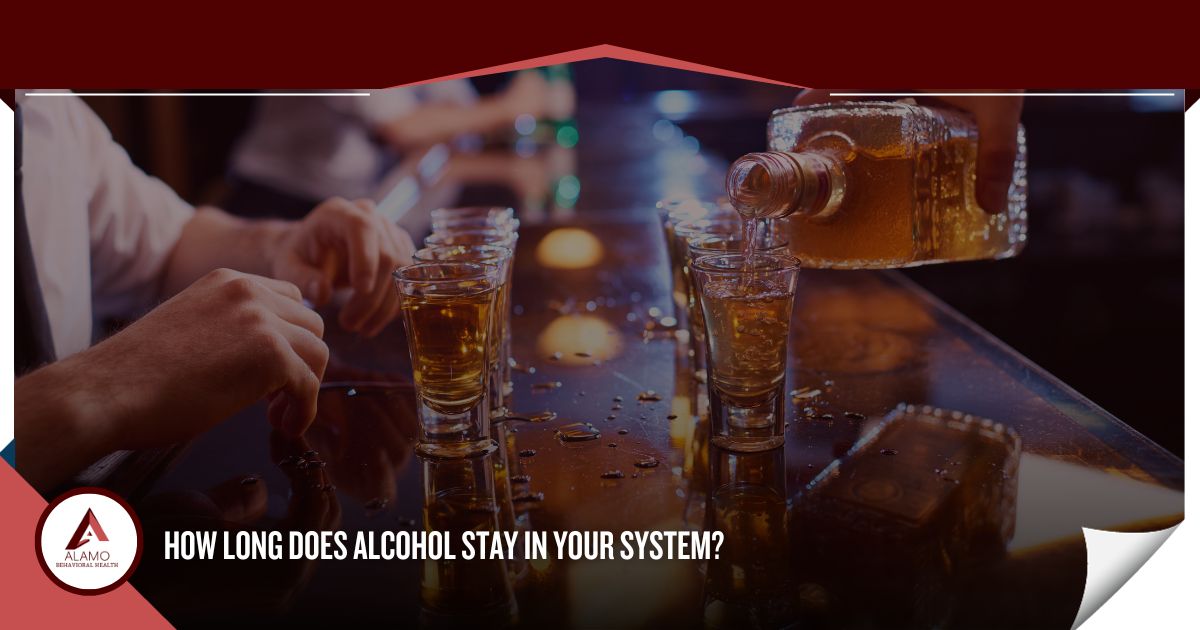
While occasional alcohol use is fine, some people have a hard time controlling how much they drink. If you or a loved one regularly abuse alcohol, you could develop an alcohol use disorder. Unfortunately, alcoholism is a chronic and progressive disease that requires extensive treatment and lifelong management to fully recover.
Knowing how long alcohol stays in your system can give you a good idea of how long it will take you to develop withdrawal symptoms if you are addicted to it.
How Does Your Body Metabolize Alcohol?
When you drink alcohol, it enters your digestive system and goes into your stomach and small intestine. While some of the alcohol is metabolized in your stomach, the rest of it enters your bloodstream where it will travel throughout the rest of your body.
Alcohol is metabolized in the liver, which can process about one drink per hour. When you drink more than one standard alcoholic beverage per hour, your liver becomes saturated. As a result, the excess alcohol will remain in your blood and other tissues until your liver can process it.
When alcohol enters your system, it is metabolized by two enzymes known as alcohol dehydrogenase (ADH) and aldehyde dehydrogenase (ALDH).[2] These enzymes turn the alcohol into acetaldehyde and carcinogen, which eventually turn into acetate. Lastly, your body will convert these chemicals into water and carbon dioxide to easily eliminate them from your system.
Factors that Affect How Long Alcohol Stays in Your System
The length of time that alcohol stays in your system depends on a variety of personal factors, including how much you drink at once. Someone who only has 2 drinks will eliminate it faster than a person who consumed 10.
Other factors that affect how long alcohol stays in your system include:
- Age
- Biological sex
- Overall health
- The health of your liver
- How much food and water you’ve consumed
- Body size and speed of metabolism
- The presence of other substances you might have consumed
The older you get, the longer it takes your liver to metabolize alcohol. As a result, your risk of damaging your liver while drinking alcohol increases with age. But regardless of age and health, anyone consuming alcohol in excess should seek professional alcoholism treatment.
How Long Can Alcohol Be Detected in Your Body?
On average, it takes about one hour for your body to eliminate a standard drink. However, the metabolites of alcohol can remain in your system longer, which is how drug testing works to determine whether you’ve consumed it recently. The length of time a drug test can detect alcohol depends on what part of your body they are testing.
Breathalyzer
Breathalyzers are devices that you blow into to determine your blood alcohol concentration (BAC). These devices can detect alcohol in your system for up to 24 hours after your last drink, depending on how much you’ve consumed.
Blood
Alcohol is eliminated from your blood at a rate of 0.015 per hour.[3] As a result, alcohol can be detected in your blood for up to 12 hours after you last consumed it.
Urine
While breathalyzers are the most common method of testing for alcohol, it can be detected in your urine in two different ways. If the ethyl glucuronide (EtG) testing method is used, alcohol can be found in your system for 3 to 5 days after you last drank it. On the other hand, traditional urine screening tests can only detect alcohol for 12 hours after your last drink.
Hair
Hair tests can detect any substance in your system for up to 90 days, including alcohol. However, hair tests are not commonly used because they can be expensive to send off to the lab. Typically, when a hair test is used it is to determine if you have used an illicit substance before you are hired for an important job.
Find Help for Alcohol Abuse and Addiction
If you or a loved one suffers from alcoholism, it’s time to seek help. Alcohol use disorder can negatively impact every area of your life and put you at risk of life-threatening health conditions. Thankfully, alcohol rehab centers can provide you with the tools and support you need to maintain long-term sobriety.
To learn more about our alcohol rehab programs in San Antonio, contact Alamo Behavioral Health today.
References:
- The National Institute of Alcohol Abuse and Alcoholism (NIAAA): Alcohol Use in the United States, Retrieved September 2023 From https://www.niaaa.nih.gov/alcohols-effects-health/alcohol-topics/alcohol-facts-and-statistics/alcohol-use-united-states-age-groups-and-demographic-characteristics
- The National Institute of Alcohol Abuse and Alcoholism (NIAAA): Alcohol Metabolism, Retrieved September 2023 From https://www.niaaa.nih.gov/publications/alcohol-metabolism
- Bowling Green State University: Alcohol Metabolism, Retrieved September 2023 From https://www.bgsu.edu/recwell/wellness-connection/alcohol-education/alcohol-metabolism.html



